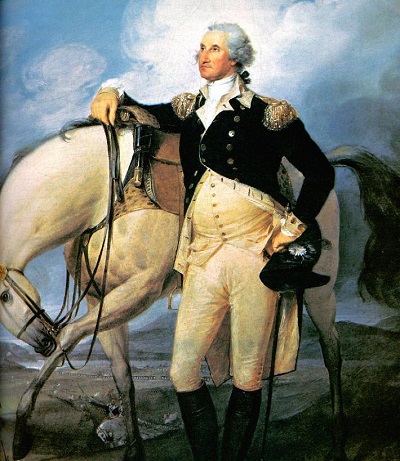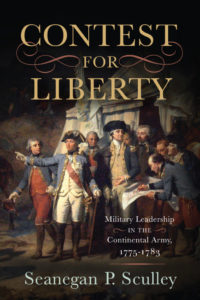In the summer of 1775, a Virginia gentleman-planter was given command of a New England army laying siege to British-occupied Boston. With his appointment, the Continental Army was born. Yet the cultural differences between those serving in the army and their new commander-in-chief led to conflicts from the very beginning that threatened to end the Revolution before it could start. The key challenge for General George Washington was establishing the standards by which the soldiers would be led by their officers. What kind of man deserved to be an officer? Under what conditions would soldiers agree to serve? And how far could the army and its leaders go to discipline soldiers who violated those enlistment conditions?
Join us on Monday, April 27, 2020 as we welcome author and historian Seanegan P. Sculley who will be talking about his book Contest for Liberty: Military Leadership in the Continental Army, 1775–1783. Our meeting place is at Scoogi’s Italian Restaurant at 738 Bethlehem Pike in Flourtown. Feel free to arrive early and eat in the back room where our meetings are held. A short business meeting will start around 7:15 pm. The presentation will start at 7:30 pm. We encourage you to join our membership for the very small and reasonable tax deductible amount of $30. Don’t forget our book raffle too. Each meeting we raffle off a number of American Revolutionary themed books. You can purchase tickets for the book raffle; $1 per ticket, or $5 for 6 tickets. The money raised goes to pay the room fee and speaker expenses.
As historian Seanegan P. Sculley reveals in Contest for Liberty: Military Leadership in the Continental Army, 1775–1783, these questions could not be determined by Washington alone. His junior officers and soldiers believed that they too had a part to play in determining how and to what degree their superior officers exercised military authority and how the army would operate during the war. A cultural negotiation concerning the use of and limits to military authority was worked out between the officers and soldiers of the Continental Army; although an unknown concept at the time, it is what we call leadership today. How this army was led and how the interactions between officers and soldiers from the various states of the new nation changed their understandings of the proper exercise of military authority was finally codified in General Friedrich Wilhelm von Steuben’s The Regulations for the Order and Discipline of the Troops of the United States, first published in 1779. The result was a form of military leadership that recognized the autonomy of the individual soldiers, a changing concept of honor, and a new American tradition of military service.
 LTC Seanegan Sculley enlisted in the US Army in January 1995 as an airborne infantryman and served in Vicenza, IT until attending Officer Candidate School in the summer of 1999. He was commissioned as an Armor officer and became a tank platoon leader in 1-12 Cavalry at Fort Hood, TX before completing his BA in History at Texas State University in December 2002. LTC Sculley then deployed to Camp Garry Owen at Munsan, Republic of Korea from 2003-2005 and then earned his MA in History at the University of Massachusetts, Amherst in 2007. From 2007-2012, he served as both an instructor and assistant professor of History at the United States Military Academy during which time he deployed to Mosul, Iraq from 2009-2010. Following his assignment to West Point, LTC Sculley attended the Command and General Staff College in 2012-2013 and then served as the Battalion Executive Officer for 4-10 Infantry Regiment and the Brigade Operations Officer for the 71st Infantry Brigade at Fort Jackson, SC. He earned his PhD in History from the University of Massachusetts, Amherst in May 2015 and he currently serves as an Academy Professor and the Division Chief for the American Division in the Department of History at West Point.
LTC Seanegan Sculley enlisted in the US Army in January 1995 as an airborne infantryman and served in Vicenza, IT until attending Officer Candidate School in the summer of 1999. He was commissioned as an Armor officer and became a tank platoon leader in 1-12 Cavalry at Fort Hood, TX before completing his BA in History at Texas State University in December 2002. LTC Sculley then deployed to Camp Garry Owen at Munsan, Republic of Korea from 2003-2005 and then earned his MA in History at the University of Massachusetts, Amherst in 2007. From 2007-2012, he served as both an instructor and assistant professor of History at the United States Military Academy during which time he deployed to Mosul, Iraq from 2009-2010. Following his assignment to West Point, LTC Sculley attended the Command and General Staff College in 2012-2013 and then served as the Battalion Executive Officer for 4-10 Infantry Regiment and the Brigade Operations Officer for the 71st Infantry Brigade at Fort Jackson, SC. He earned his PhD in History from the University of Massachusetts, Amherst in May 2015 and he currently serves as an Academy Professor and the Division Chief for the American Division in the Department of History at West Point.

